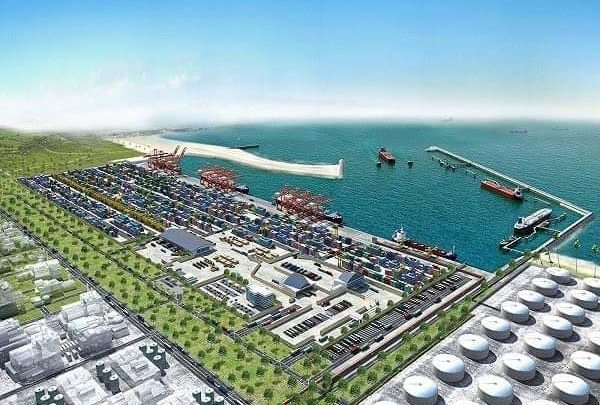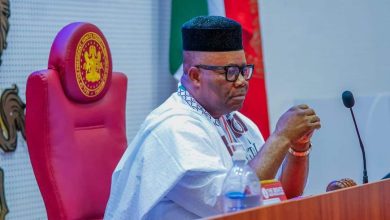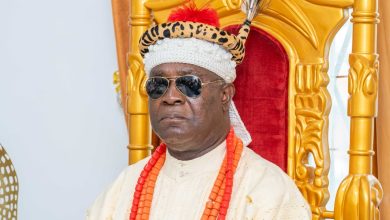
” The commencement of Ibom Deep Seaport will soon become a reality. This is because we have completed 20 out of 22 items on the checklist for the commencement of the project and we are currently on the 21 item on the Checklist. Interestingly, we are receiving adequate cooperation from the Federal government “. – Akwa Ibom State Commissioner for Economic Development and Ibom Deep Seaport, Mr Akan Okon, December 29, 2019.
The above assurance from the Commissioner whose Ministry is charged with the responsibility of working towards the actualization of Ibom Deep Seaport project sparkles the heart with hope that the sojourn which began in 2003 may soon reach a state of actualization.
Many Akwa Ibom people indeed look forward to the State having a deep seaport. Besides the expectation of a highly improved economic fortunes for government, it is the hope of many, that the project will address the challenge of high level of unemployment in the State. According to Governor Udom Emmanuel as imprinted in his 2019 Manifesto, ” Ibom Deep Seaport and Ibom Industrial City projects have the potentials to create over 300,000 direct and indirect jobs between 2021 and 2050″.
Nevertheless, there are many who are still of the opinion that the reality on ground has not given adequate evidence that the seaport project will commence soon. Among the reasons theorized are that over 15 other applications from States for deep seaport projects are currently with the relevant federal authorities for approval especially as neighbouring Cross River State has joined States seeking to own a deep seaport. This, many pundits opine makes the competition very high for Akwa Ibom State.
Besides this, there are reported fears that there is high level of political gimmicks at the centre militating against the materialization of the deep seaport in Akwa Ibom State. This comes with claims that if the Ibom deep seaport materializes, considering its high valued depth of 16.5 meters without dredging, operations at the port may swallow up the economic benefits Lagos State enjoy from their seaport.
Be that as it may, the Commissioner for Economic Development and Ibom Deep Seaport insists that the fears are unfounded.
While noting that the federal government is interested in the materialization of the project, he says ” For us to get to where we are means we have received adequate cooperation. The federal government needs this project too because they are looking at opportunity to create employment.” He gives further reason on why the Federal government will support the project to the end: ” I do not think any reasonable government will stop a project that is aimed at providing employment opportunities for Nigerians. It is not an Akwa Ibom project. It will provide employment for Nigerians. The Federal Government understands the advantage and benefit of having this project in Akwa Ibom State. ”
On his part, the Akwa Ibom state Governor, Mr Udom Emmanuel says his intention is to see that the Deep Seaport is completed before the end of his tenure in 2023.
According to his pledge captured in his 2019 Manifesto, he notes ” With the effort of my Technical Committee on the Deep Seaport, the project has already recorded tremendous success starting from ‘issuance of approval of procurement process’ to ‘negotiation of terms and condition with the preferred bidder’ for the Deep Seaport (Bollore-Power China Consortium).
” This, therefore, proves my commitment to the Deep Seaport project and the pledge that in the next four years of my administration, the port will commence full operation as my completion agenda has made the Deep Seaport a top priority.”
At the occasion of his swearing in as Governor for a second term on May 29, 2019, Governor Udom Emmanuel reiterated that the realization of Ibom Deep seaport project will be his second term signature project.
As the clock ticks each passing day with the project yet to leave the papers to actual construction, the Akwa Ibom State Governor at the annual rededication of the State to God on January 2, 2020 ensured prayers for the speedy realization of the Ibom Deep Seaport project topped the intercessory supplications.

Yet, as prayers, assurances and optimism abound, one is left to wonder how really prepared the State is to reap maximum benefit from the project in a situation it materializes.
The need for Strategic Positioning
Akwa Ibom State is a key partner and host to the Ibom Deep Seaport project. Hence, the Government of Akwa Ibom State has called on the people of the State to position themselves strategically towards acquiring the necessary skills that will be needed during the construction and actual operation of the Seaport.
The State Government gave the charge recently through the Akwa lbom State Commissioner for Economic Development and Ibom Deep Seaport, Mr Akan Okon.
The Commissioner decried the opportunities the State missed out when one of her investment, Ibom Air was set up. He noted that when the Airline was to commence operation, the State Government had issues with having adequate number of qualified personnel from Akwa Ibom State to serve as pilots.
” We didn’t have the required number of people from Akwa Ibom State, so we had to employ people from other places”, he said. To halt a repeat of that, the Commissioner recommended: ” Ibom Deep Seaport will commence soon. There is need for Akwa Ibom people to strategically position themselves and acquire the necessary skills that will be needed during the construction and operation of the port.”
What then are opportunities that beckon for exploit in a seaport?
Opportunities Available for Exploit
According to the Institute of Marine Engineering, Science and Technology, IMarEST, an international professional body and learned society for all marine professionals, Ports can be busy places and offer exciting opportunities in many different areas. The Institute says that Jobs in ports range from stevedores to harbour masters. They explain that the size and function of a port will determine the number of employees noting that some of the largest ports employ over a thousand people. What services does a port really offer thus provide a large opportunity for employment, one may wonder. A port basically deal with imports and exports of raw materials and finished goods, provide facilities for the fishing industry, provide ferry and cruise-ship terminals and offer recreational facilities, such as yacht marinas.
With the services available, IMarEST notes that there are opportunities in technical work, administration, customs and management. Some of the jobs available in port operations are described by the Institute below:
Marine/port operatives – These ones undertake various jobs on the water around the harbour/port area, such as moving navigational markers, positioning gangways, taking marine pilots out to ships, and possibly operating lock gates.
Passenger operatives – They work in ports that accommodate ferries and/ or cruise ships. They control the movement of passengers (and passengers in vehicles) around the port area, and on and off the ferries/ships; they may also check tickets and deal with passengers’ queries.
Stevedores – load and unload cargo; they may decide how to stack cargo in the best way or how to unload goods quickly and efficiently. They may have to drive different types of vehicles, or operate cranes, suction pipes and conveyer belts.
Vessel traffic services operatives – work in the port control centre, controlling the safe movement of ships and boats around the port/ harbour area. They use marine radar and communicate with vessels by VHF radio, radio telephone among others.
Marine pilots – board vessels entering or leaving the port or harbour, and navigate them safely in and out avoiding submerged rocks and other hazards.
Harbour masters – ensure that the port is safe for all the vessels using it. They monitor environmental standards and manage leisure craft activity within the harbour.
Engineers – maintain and repair machinery and equipment within the port.
Port managers – manage all aspects of the work of the port, including health and safety and port development, liaising with the organisations using the port, such as freight companies.
What skills and personal qualities do interested persons need?
IMarEST recommends that to work in ports one need to be very safety-conscious, have team-working and communication skills, be fit and healthy especially as some jobs require heavy lifting.
They add that those who are interested must be prepared to work irregular hours and also have language skills. Nonetheless, what about entry, training and qualifications?
Qualifications
The Maritime Firm notes that there are opportunities for people with different levels of qualification and experience. They state that in many of the practical roles, such as stevedore or marine/ port operative, no formal educational qualifications are required but add that passing through a maritime school is always useful.
IMarEST adds ” The work can be very physical and involves being outside in all weathers. Previous experience of warehouse or transport services may be useful. Stevedores must have a driving licence. Experience of dealing with customers may be useful for passenger operatives.
“Training for all these positions is usually on the job, and you may be able to work towards relevant qualifications.”
The firm recommends that Marine pilots will normally have considerable experience at sea, as deck officers for example.
IMarEST however says that entry requirements vary depending on the pilot authority but candidates will usually need a ship master’s certificate.
For jobs on the commercial and administration side, the maritime firm points out that an interested person may need GCE, A levels, or equivalent qualifications. They however recommend gaining knowledge in a maritime school as an added advantage.
But that is not enough. They add ” The technical management of port facilities are usually carried out by people with some experience at sea, or with engineering qualifications and training”.
With the requirements outlined, are there indications that the State is rightly placed to be absorbed in the port when operation commences?
State’s preparation for Ibom Deep Seaport
A stakeholder in one of the host communities of Ibom Deep seaport and former lawmaker in the Akwa Ibom State House of Assembly, Barr Bassey Etienam notes that the Maritime Academy, Oron can serve as a veritable ground in moulding qualified personnel of Akwa Ibom extraction who would work in the seaport.
Although he expresses doubt that there are adequate indications that operation will begin anytime soon at the proposed site of the port, the former lawmaker advise that the State should rather push for the Bill clamouring for Maritime Academy, Oron to become a degree Awarding Institution be passed and assented into law.
Commenting on the concern where most lands in the host communities have been purchased mostly by people from other States in preparation for erecting warehouses, Etienam offers insight to the fact that such should not be an issue noting that seaport creates room for investment from investors from all backgrounds.
He states ” The seaport is bigger than an Oron project hence anyone can start to buy land. It is a project that will benefit Akwa Ibom people, South south and Nigeria.”
Etienam however points out that where necessary, according to the provisions of Land Use Act, the powers to manage land is vested with the State government hence the Governor is empowered to revoke and award land to people.
The former lawmaker argues that for Akwa Ibom State to show preparation for the project, infrastructures that will service the seaport must be provided.
A look into the 2019 manifesto of Governor Udom Emmanuel shows that construction of access roads to the Ibom Deep seaport project and Ibom Industrial City was to take place within the first quarter of year 2019. That is yet to see the light of the day.
Consequently, Etienam posits ” The main preparation should be about infrastructure. You cannot have a deep seaport without a way in and a way out of the seaport.
While expressing dismay over the state of roads in areas that will connect the port to other parts of the State, the former lawmaker insists that the peoples consciousness about the possibility of the port coming into reality will manifest when government become serious in providing roads that will link the port.
He added ” If we want to talk about preparation, we should talk about road network. You can not provide a seaport without roads. We need roads that can carry heavy duty vehicles. Do not forget that trucks will be leaving the deep seaport with containers.”
From the concerns and recommendations expressed, Seaport provide a large range of employment and business opportunities. Gaining the necessary skills now will equip Akwa Ibom people against being taken unawares in a situation where operation begins at the port.
It is also the expectation of the people that if government is truly optimistic over the project, they must start now to provide necessary infrastructures in preparation of the takeoff of the port.




